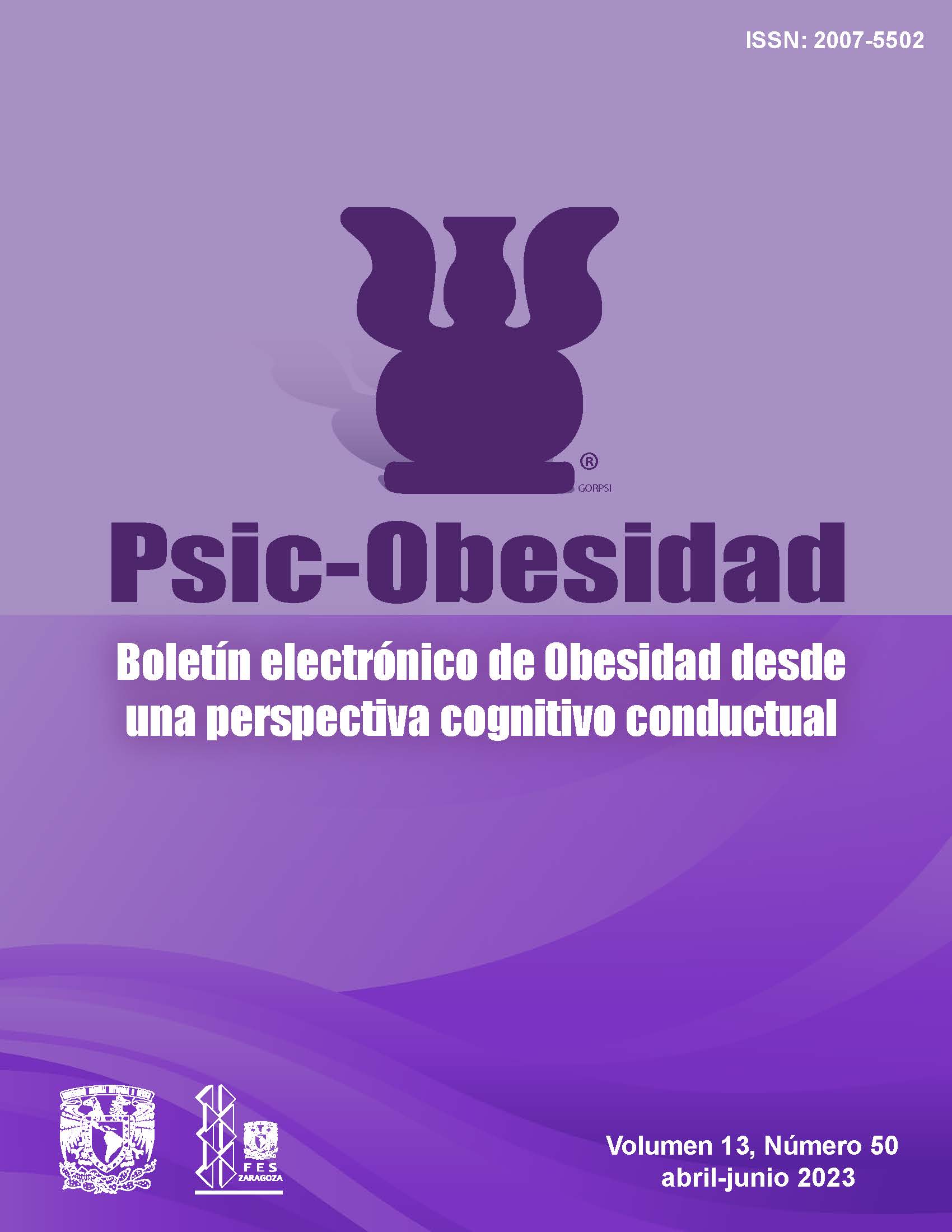Conceptos básicos de la obesidad y el sobrepeso
Contenu principal de l'article
Résumé
La obesidad es considerada actualmente uno de los problemas más importantes a tratar, es un reto sanitario a nivel mundial, debido a que es cada vez más frecuente la adopción de hábitos alimenticios poco saludables, que es uno de los factores que se encuentra íntimamente relacionado con el sobrepeso y la obesidad, además de las problemáticas que conllevan las comorbilidades asociadas. Para la OMS (2021) la Obesidad es una compleja enfermedad multifactorial no transmisible, factor de riesgo a otras enfermedades no transmisibles (ENT) y un factor de riesgo modificable en la Diabetes Tipo 2, que se asocia a problemas de salud mental y limitaciones funcionales de diferente índole. La obesidad se asocia con un espectro muy amplio de alteraciones fisiopatológicas como lo es la sobrecarga de volumen, hipertensión, desregulación metabólica, activación neurohumoral e inflamación sistémica. Las causales principales son la genética, la biología, el acceso a la atención de salud, la salud mental, la alimentación, los factores socioculturales, la economía, el medio ambiente y los intereses comerciales. En este trabajo se realiza un abordaje de los principales conceptos asociados a la obesidad, que permiten una mayor y mejor comprensión del tema, comprende algunas de las definiciones más claras, la epidemiología, la fisiopatología, el mecanismo para el diagnóstico y las propuestas para el tratamiento.
Téléchargements
Renseignements sur l'article
Citas en Dimensions Service
Références
Amancio-Chassin, O., Ortigoza-Ramírez, J.L., & Durante-Montiel, I. (2007). Obesidad. Seminario: El Ejercicio Actual de la Medicina. http://www.facmed.unam.mx/sms/seam2k1/2007 /may_01_ponencia.html
Barrera-Cruz, A., Ávila-Jiménez, L., Cano-Pérez, E., Molina-Ayala, M.A., Parrilla-Ortiz, J.I., et al (2013). Guía de práctica clínica. Prevención, diagnóstico y tratamiento del sobrepeso y la obesidad exógena. Revista Médica del Instituto Mexicano del Seguro Social, 51(3), 344-357. https://www.redalyc.org/pdf/4577/457745489021.pdf
Cano-Perez, E., Meoño-Morales, E.E., Mendoza Salazar, L., Pérez-Pavón, A., Gallardo- Wong, I., & Barrera-Cruz, A. (2008). Guía de Práctica Clínica para el Diagnóstico, Tratamiento y Prevención de sobrepeso y la obesidad en el adulto. http://www.cenetec.salud.gob.mx/interior/gpc.html
Córdova, V.J.Á., Barriguete, M.J.A., Rivera, M.M.E., Manuell, L.G. & Mancha, M.C. (2023). Sobrepeso y obesidad. Situación actual y perspectivas. Acta Med GA, 21 (s1), s51-s56. https://dx.doi.org/10.35366/109563 DOI: https://doi.org/10.35366/109563
Dávila-Torres, J., González-Izquierdo, J.J., & Barrera-Cruz, A. (2015). Panorama de la obesidad en México. Revista Médica del Instituto Mexicano del Seguro Social, 53(2), 241-249. https://www.redalyc.org/pdf/4577/457744936020.pdf
Documento de debate de la OMS (19 de agosto del 2021). Proyectos de recomendaciones para la prevención y el tratamiento de la obesidad a lo largo del curso de la vida, incluidas las posibles metas. https://cdn.who.int/media/docs/default-source/obesity/who-discussion-paper-on-obesity---final190821-es.pdf
Escobar-Duque, I.D., Sánchez-Vanegas, G., Aldana-Parra, F., Arévalo-Rodríguez, Í., Dorado, L.F., et al. (2017). Guía de práctica clínica (GPC) para la prevención, diagnóstico y tratamiento del sobrepeso y la obesidad en adultos. Universitas Médica, 58(2), x-x, https://dx.doi.org/10.11144/Javeriana.umed58-2.obes DOI: https://doi.org/10.11144/Javeriana.umed58-2.obes
Ferguson, B. (2014). ACSM’s Guidelines for Exercise Testing and Prescription 9th ed. J Can Chiropr Assoc, 58(3), 328. PMCID: PMC4139760
García, M.A.J., & Creus, G.E.D. (2016). La obesidad como factor de riesgo, sus determinantes y tratamiento. Rev Cubana Med Gen Integr, 32(3), 1-13. https://www.medigraphic.com/cgi-bin/new/resumen.cgi?IDARTICULO=76694
Hervás, G., Cebolla, A., & Soler, J. (2016). Intervenciones psicológicas basadas en mindfulness y sus beneficios: estado actual de la cuestión. Clínica y Salud, 27(3), 115-124. https://dx.doi.org/10.1016/j.clysa.2016.09.002. DOI: https://doi.org/10.1016/j.clysa.2016.09.002
Meneses-Sierra, E., Ochoa-Martínez, C, Burciaga-Jiménez, E., Gómez-Mendoza, R, et al. (2023). Abordaje multidisciplinario del sobrepeso y la obesidad en adultos. Med Int Méx, 39 (2), 329-366, https://doi.org/10.24245/mim.v39i2.8511 DOI: https://doi.org/10.24245/mim.v39i2.8511
OCDE (2019), The Heavy Burden of Obesity: The Economics of Prevention, OECD Health Policy Studies, Ediciones OCDE, París, https://dx.doi.org/10.1787/67450d67-en. DOI: https://doi.org/10.1787/67450d67-en
Organización Mundial de la Salud (OMS) (2017). Obesidad. Noticias OMS. http://www.who.int/es/news-room/fact-sheets/detail/obesity-and-overweight
Pacheco-Sánchez, D., Pinto-Fuentes, P., Asensio-Díaz, E. (2019). Actualización en cirugía bariátrica/metabólica. Nutr Clin Med, XIII, 113-27. DOI:10.7400/NCM.2019.13.2.5077.,
Proyecto de Modificación a la Norma Oficial Mexicana NOM-008-SSA3-2010, Para el tratamiento integral del sobrepeso y la obesidad, para quedar como Norma Oficial Mexicana NOM-008-SSA3-2016, Para el tratamiento integral del sobrepeso y la obesidad. Diario Oficial de la Federación 25/01/2017
Salvador, J., & Frühbeck, G. (2011). La asociación obesidad-enfermedad psiquiátrica: una necesidad más de abordaje multidisciplinar. Anales Sis San Navarra, 34(2), 141-144. https://dx.doi.org/10.4321/S1137-66272011000200001. DOI: https://doi.org/10.4321/S1137-66272011000200001
Suárez-Carmona, W., Sánchez-Oliver, A.J., González-Jurado, J.A. (2017). Fisiopatología de la obesidad: Perspectiva actual. Rev. Chil. Nutr., 44 (3), 226-233. http://dx.doi.org/10.4067/s0717-75182017000300226. DOI: https://doi.org/10.4067/S0717-75182017000300226
Warren, J.M., Smith, N., Ashwell, M. (2017). A structured literatura review on the role of mindfulness, mindful eating and intuitive eating in changing eating behaviours: effectiveness and associated potential mechanisms. Nutr Res Rev, 30(2), 272-283. doi: 10.1017/S0954422417000154. DOI: https://doi.org/10.1017/S0954422417000154
World Health Organization (who) (1995). Physical status: the use of and interpretation of anthropometry, report of a WHO expert committee. Vol. 1, WHO Technical Report Series 854. World Health Organization. https://apps.who.int/iris/handle/10665/37003




